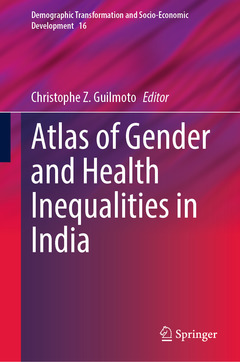Description
Atlas of Gender and Health Inequalities in India, 1st ed. 2023
Demographic Transformation and Socio-Economic Development Series, Vol. 16
Coordinator: Guilmoto Christophe Z.
Language: English
Subjects for Atlas of Gender and Health Inequalities in India:
247 p. · 15.5x23.5 cm · Hardback
Description
/li>Contents
/li>Biography
/li>Comment
/li>
How will the world's largest population approach its inequality challenges? This volume addresses this question by unraveling different strands of India's emerging health and gender geographies. It is the first book to offer a comparative study of these disparities in India, stressing the deep interaction between health challenges and patriarchal features. Most themes explored in this book illustrate the entangled nature of the social and regional determinants of gender and health imbalances in India.
Through its rich cartography of contemporary India, the book represents the first Atlas exploiting district-level figures drawn from the latest sociodemographic survey conducted in 2019-21. After an initial methodological synopsis, the book is built around twenty chapters?illustrated by 75 original maps, figures, and tables prepared by thirty authors?and concludes with a synthesis of India's spatial patterns. Chapters engage with major themes of gender and health inequalities and explore an array of innovative indicators such as access to menstrual hygiene, cesarean deliveries, health insurance, son preference in fertility, female landownership, patrilocal systems, hypertension, anemia, hysterectomy, girl-only or single-child families, or traditional contraception. Together, they provide an often surprising glimpse into the present and future of India's gender and health landscape, highlighting the considerable progress accomplished over the last two decades alongside persistent gaps and emerging issues.1. Sources, Maps, and Spatial Analysis (Christophe Z. Guilmoto).- Part 1. Nutrition and Morbidity.- 2. Underweight and Overweight Prevalence among Indian Women (Rakesh Kumar, Abhishek Kumar, Sunil Rajpal, and William Joe).- 3. Vegetarianism and Non-Vegetarian Consumption in India (Mathieu Ferry).- 4. Diabetes and Hypertension among Indian women (Moradhvaj Dhakad).- 5. Anemia among Children and Women in India (Ankita Srivastava and Bandita Boro).- 6. Female Under-five Mortality in India (Jayanta Kumar Bora).- Part 2. Gender.- 7. Women’s Land Ownership and Patrilocality in India (Thomas Licart).- 8. Spatial Patterns of Son Preference in India (Abhishek Singh and Ashish Kumar Upadhyay).- 9. Girl-only Families in India (Mary E. John and Christophe Z Guilmoto).- 10. Migration of Husbands of Indian Women (Kirti Gaur and Kunal Keshri).- 11. Age at Marriage of Indian Women (Aparajita Chattopadhyay and Akancha Singh).- Part 3. Reproductive Health.- 12. Menstrual Hygiene Practices Among Indian Women (M. Sivakami).- 13. Utilization of Antenatal Care Services Among Indian Women (Junaid Khan).- 14. Institutional Delivery and Cesarean Births in India (Christophe Z Guilmoto).- 15. Immunization Coverage among Indian Children (Basant Kumar Panda and Gulshan Kumar).- 16. Hysterectomy in India (Angad Singh and Dipti Govil).- 17. Health Insurance Coverage in India (Bertrand Lefebvre).- Part 4. Reproduction.- 18. Fertility Differentials in India (Ismail Haque and Md Juel Rana).- 19. Lowest-Low Fertility in India (Koyel Sarkar).- 20. Female Sterilization in India (Raman Mishra).- 21. Modern and Traditional Contraception among Indian Women (Aditi Kundu, Bhaswati Das, and Angad Singh).- 22. The Geography of Gender and Health Inequalities in India (Christophe Z Guilmoto).
Christophe Z Guilmoto is a Senior Fellow in demography at the French Institut de recherche pour le développement (IRD) affiliated to the CEPED research unit in Paris. In France, he taught at Université Paris Descartes and EHESS. He joined in 2021 the Centre de Sciences Humaines, New Delhi, to work on the demography of inequalities.
He was trained initially in Mathematics and Sociology. After researching at the Madras Institute of Development Studies in Chennai and the Institute of Economic Growth in Delhi, he received a Ph.D. in Demography in 1989 at Paris I University for a dissertation on India's historical demography. He then worked in Senegal in the early 1990s and published extensively on international migration. In 1997-2002, he was based at the French Institute of Pondicherry and worked on fertility decline in India. Over the last decade, his research mainly focused on prenatal sex selection from Albania to China. He has organized several conferences, panels, and training sessions on sex imbalances at birth in Europe and Asia and wrote more than ten monographs on gender-biased sex selection in countries of Asia and Eastern Europe, including the global report on sex imbalances at birth published by the UNFPA.
His last book was Demographic Transformation in China, India, and Indonesia (coedited with Gavin Jones, Springer 2016). His recent work appeared notably in Population Studies, Population and Development Review, Population, The Conversation,PLoS-One, JAMA, Lancet Global Health, The History of the Family, and BMJ Global Health.
Provides a blended approach to gender and health in India
Includes a unique atlas of India’s 707 districts
Discusses the most recent numbers on gender and health inequalities in India




